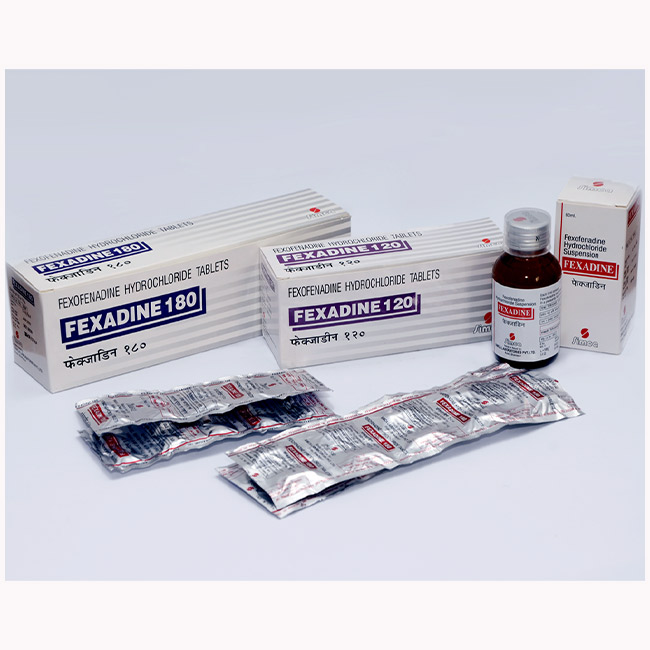Fexadine
Generic composition: Fexofenadine HCl
General Introduction
Fexadine contains fexofenadine, a second generation antihistamine. Fexofenadine is H1 receptor antagonist.
Therapeutic category
- Anti-histamines
Dosage forms available
- FEXADINE 120mg Tablets
- FEXADINE 180mg Tablets
- FEXADINE Suspension 30mg/5ml
Mechanism of action
Fexofenadine is considered an “inverse agonist” of the H1 receptor because it binds to and stabilizes the inactive form of the receptor, preventing its activation and subsequent downstream effects. It has a potent and selective affinity for H1 receptors, and there is no evidence that it carries antidopaminergic, antiserotonergic, anticholinergic, sedative, or adrenergic blocking activity.
Pharmacokinetics
Absorption: Rapidly absorbed from the GI tract following oral administration, peak plasma concentrations achieved in about 2.6 hours, antihistaminic effect occurs within 1–3 hours and persists for about 12 hours, 60–70% plasma protein binding.
Distribution: It is distributed into the small and large intestines, stomach, pancreas, liver, and kidney in animals, does not appear to cross the blood-brain barrier,
Metabolism: Metabolized in the liver and eliminated via feces.
Elimination: very minimally metabolized, with only 5% of an ingested dose undergoing hepatic metabolism.
Half-life: terminal elimination half-life is approximately 11-15 hours.
Uses
- Allergic rhinitis
- Chronic urticaria
- Allergic skin disorders
- Allergic manifestation of ophthalmic origin
Dose
- Adults: 120mg OD for allergic rhinitis and 180mg OD for urticaria and other skin diseases.
- Children: 5 ml every q12 hourly (30mg twice daily)
Side Effects
Headache, upper respiratory tract infection, coughing, nausea, dysmenorrhea, sinusitis, dizziness, drowsiness, dyspepsia, fatigue, headache.
Precautions
Renal impairment, geriatric patients, pregnancy, lactating infant, rash, urticaria, pruritus, and hypersensitivity reactions (e.g., angioedema, chest tightness, dyspnea, flushing, anaphylaxis) reported rarely.
Advantages
Fexofenadine does not cross the blood-brain barrier and thus is unlikely to cause significant CNS effects.


